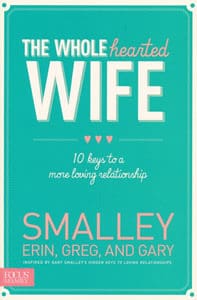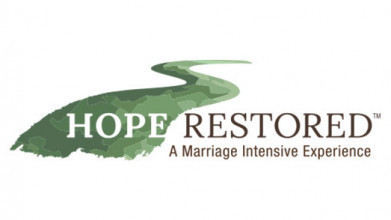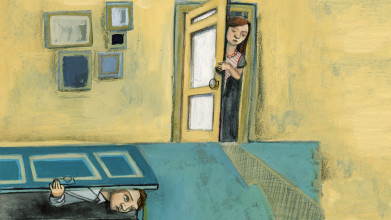Preview:
Dr. Greg Smalley: You know, for me, I think one of the, the best questions that we can ever ask in a marriage is not how do we have a better marriage. I think that, actually, that is the worst question.
Jim Daly: Why?
Greg: Well, because I can’t control Erin and it takes two of us to have a great marriage. I think the best question that we can ask in our marriage is how can I be a better spouse?
End of Preview
John Fuller: Dr. Greg Smalley is back with us again today on Focus on the Family, along with his wife, Erin, and they’re describing better ways husbands and wives can work through expectations and disappointments and experience the kind of marriage that God designed for us. Your host is Focus president and author Jim Daly. Thanks for joining us today. I’m John Fuller.
Jim: Uh, John, we had a wonderful conversation last time with the Smalley’s and, if you missed that, get a CD or download or get the app for your smartphone. It’s really easy to do. This is good stuff that every marriage really needs, uh, not only to survive, but to thrive as a couple. And I want to challenge those of us who claim the name of Christ, in a culture where marriage is constantly being redefined and often degraded, we need to show the world something better. Uh, we don’t have to be perfect, but better is a good goal. We have to live out God’s word in how we love and serve our spouse and, when you do that, you’ll experience a more fulfilling relationship. Uh, Greg and Erin are experts in this field. They’ve devoted their lives to bettering not only their own marriage, but everyone else around them as well. They head up our marriage ministry team here at Focus, and I really appreciate their insights. Uh, their humor is just like Greg’s dad, Gary, so rich, and their vulnerability about the challenges that they faced in their own marriage, uh, that, I think, is what attracts people to them. They’re very open about their shortcomings, and I’m looking forward to part two of our discussion.
John: And the Smalley’s have written a wonderful book. It’s called The Wholehearted Wife: 10 Keys to a More Loving Relationship. And, by the way, the co-writer on this book was Greg’s dad, the late Gary Smalley. He was a great friend to this ministry and one of our most popular broadcast guests. You can get the Smalley’s book at focusonthefamily.com/broadcast or when you call 800, the letter A, and the word FAMILY. And, today on the episode, we’re going to pick up our conversation with the Smalley’s at the point where Erin responded to some of the common frustrations that wives have in marriage.
Erin Smalley: Really, we desire more than that. We want a great marriage. We want a great relationship. No, we can’t control our spouse, our, our husband, we can’t change him, but we sure have the power to influence. And so I love Ephesians 6:7. It says, “Serve wholeheartedly, as if you were serving the Lord, not man.” And so, really, when I show up as a wife, I want to serve, I want to serve the Lord. I want to serve wholeheartedly. I’m all in. I want to do everything I can that I can control, and that’s me, in this marriage relationship, to influence and to impact this relationship.
Jim: And, and we left last time talking about the choices that we make, our attitude.
Erin: Mm-hmm.
Jim: And, you know, I feel that with Jean and me. I’m sure, John, you and Dena have this.
John: Absolutely, we do.
Jim: Uh, but sometimes, just out of your own experience, your background, your nature comes out and you default to that setting, and something frustrates you or makes you angry and that’s where the evening goes and now it’s you got to talk it through. Uh, what do you mean, in the book, about choosing a better path. H- how do we really choose to react to our spouse in a better way?
Erin: Mm-hmm. And, really, because often we’re not even aware of what we’re doing, of how we’re viewing our spouse, how we’re treating our spouse, and so, really, it’s taking a step back and, instead of focusing on him, which, again, last time, I said it’s really a lot more fun to focus on him, (laughing) um, you know, to really take a look at yourself and just becoming aware of how am I seeing him and how am I viewing him? So, when we’ve been hurt, when we’ve been disappointed, we forget how valuable they are, and the bottom line, God, scripture says how valuable he is, that he’s made in His image. His value does not change because God says so, and so, when we’re grounded, when we’re spending time with the Lord, when we’re filled up, when our eyes are on Him, on the Lord, then it’s easier to remember just what a precious individual we’ve married.
Jim: Uh, let’s talk a minute about what we bring into marriage. I touched on that. It, it tends to form our opinions and, and the way we react under crisis or-
Erin: Mm-hmm.
Jim: … maybe just generally, and I see that. I can be really sharp with my tongue and my thoughts. I’m, uh, fairly quick, maybe not that quick, (laughing) in terms of responding to something, and, and I think, for Jean and I, that’s where I, I’ve got to be careful and mindful that I don’t use either the, kind of the sharp wit to cut down, and I, I do that far too often. And, uh, and she’s very much a Golden Retriever-
Greg: Yeah.
Jim: … and very loving person-
Greg: Yeah.
Jim: … very kind person.
Greg: Sensitive, relational, yeah.
Jim: And so my cute little darts that I give myself such credit for actually are just crushing her-
John: Mm-hmm.
Greg: Yeah.
Jim: … and I’ve, I think I’ve got my hands on that far better than when I was younger and more immature in our marriage. I guess Jean will have to let me know, (laughing) which she will tonight when I get home, (laughing) but, but that’s what I’m talking about. What, Erin, what did you bring in to your relationship with Greg? What family of origin things? What did you have to work through?
Erin: Mm-hmm. I had, I, I mentioned this yesterday, that I had a lot of, um … I was lacking a lot of knowledge and skills with relationships, and so I learned a lot from Greg’s dad and from bible studies, from other women, and, and really set off on a journey of learning and growing. And, really, uh, communication wasn’t a strong point for me, conflicts, how to deal with conflicts in a healthy way wasn’t a big strength for me, and then also anger was something that … I was raised in a home where my dad, he was the, the most gentle spirit, but, boy, when he got upset, it was, it, you know-
Jim: It exploded.
Erin: … it was an explosion. And so, often, in our family, when we would work through something, it was very explosive and very volatile, versus Greg came from a family where that was not the case at all.
Greg: Oh, we, we avoided conflict. We would never raise our voices, and so, as Erin and I (laughs) would get into disagreements and the energy would go up and her voice would go up, I mean, it just … I didn’t know what to do.
Jim: So you’re coming from really two opposite extremes.
Greg: Oh, very much so.
Erin: Mm-hmm.
Greg: Yeah.
Jim: You, uh, how did you reconcile that? How did you learn that, uh, were both kind of in a not so good spot? Where’s good middle ground?
Greg: Yeah. I mean, that was … part of our problem is that how we handle conflict ultimately is we, we call it we’re both fighters, like we’re going to pursue, we’re going to engage. We want to battle this thing through. We want to talk it through. We want to argue it through. And, oftentimes in a marriage, you see one that’s more of a fighter, the other’s a flighter, more of a withdrawer, but, for us, oh, we were going to go toe to toe in the sense of we’re going to engage and pursue one another and, you know, and that’s what was so challenging, you know, for us. It’s hard and it’s something that we still have to, to work on. I know, just the other day, I was driving in t parking lot of our school dropping the kids off and it was, there was a lot, this is a while ago, there’s snow and, and we were late and I was frustrated with Erin, going, you know, I was meaning to leave on time and whatever was going on, you know, the, we couldn’t leave on time so I was late and, uh, there’s snow on the ground and, literally, I wasn’t paying attention and I smashed into the back of this woman’s van.
Jim: Oh, my.
Greg: So now, talk about being really late, so she gets out and so we’re talking, and it was cold so I brought her into my car, giving her my information, and so she’s writing down my information of my license and the radio was on (laughing) and so, all of a sudden, a commercial came on that was talking about this, this father-daughter dance that was coming up in the Colorado Springs area and, as soon as I heard it, I went, “Oh, no.” And so she’s listening to this and she goes, “Hey, my husband and daughter, they’re going to that,” and I was like, “Uh-huh,” and, all of a sudden, it said, “And featuring special guest speaker Dr. Greg Smalley,” (laughing).
Jim: Oh.
Greg: And she’s looking at the license, she went, “That’s you,” and I went, “Yes (laughing). Please don’t tell anybody what I, what I’ve done.” I was so … uh, just so through all of that, I was just frustrated. I mean, uh, you know, I smashed her car, smashed my car. Now there’s all this damage I got to pay and I remember calling her and just didn’t handle it right. And, you know, I was frustrated and (laughing) … versus, you know, more than anything, I think what I’ve learned and, and this is the whole point of the book, is that it’s not about how can I have a better marriage, it’s how can I be a better spouse. What do I need to learn? What I’ve learned is that I need a little bit of time before I call her, before I respond to her, (laughs) or it’s not going to go well. I need some time to pull back and, especially, to go to the Lord and try to get some perspective. And more than anything that I’ve learned about conflict, that’s what’s helped me is that, um, if I can just get a little bit of distance and then go to the Lord, and, usually, it’s like, “Okay, Your daughter, You created her, what in the world … what is she doing? You te- …” you know, but finally, in the midst of my prayer, I finally sink into, “God, what do I need to do? What are You, how are You going to use this to reveal something about me that I need to, to work on?” And what I’ve found is that, when I focus on me in those moments to get my heart back open, then I’m able to come back and reengage and then we have a better conversation. The thing that messes me up is, when I’m hurt and frustrated and mad, if I go to her off the bat, it’s never going to work ’cause I’m shut down.
Jim: And, and, Greg, that really is the thing about setting patterns. That’s where you get into a habit and a pattern and then you don’t communicate, and he just watches news, weather, and sports and she’s doing other things and you’re not, um, having relationship, and then it snowballs, doesn’t it? What do we need to do as husbands? We said we were going to pick on husbands a bit (laughing). Let’s pick on ourselves. Wh- what do we need to do to better understand how to help our wives become wholehearted, because we have a role in it?
Greg: Yeah. We are … I, I always like to think that part of my job is not to make Erin become more like Christ, (laughing) tried to do that-
Jim: Yeah, that’s not a good, uh-
Greg: … uh, it really doesn’t, don’t say that out loud, by the way, but, really, I am also her helpmate. In other words, I’m helping her on this journey that she’s on with the Lord to become more like Him, so how can I help her? And, and I just … I always go back to Ephesians 5. I mean, when you think of that whole passage of scripture, Ephesians 5:25 through 33. Here’s what stands out to me for the man. Okay, Paul uses approximately 216 words in that section of scripture.
Jim: Approximately.
Greg: Approximately, okay, (laughing). Okay, 62 of them are addressed to the wife, 154 of those words are addressed to the husband.
Jim: And most women right now are saying, “See? It proves my point (laughs).”
Greg: Okay, that’s 71% of what Paul is saying is directed to the man. That’s a big deal. There’s something there that I really need to understand, so then-
Jim: And give us the nutshell of what he’s-
Greg: Yeah.
Jim: … saying to us.
Greg: I think what it comes down to, one, again, we all know this, but, you know, my job is to love her sacrificially. So Christ gave up His life for the church, I am to love her that way, giving up what I want, serving her. I mean, we’ve talked about this before. What would it be like in a marriage if every single day that I woke up trying to out-serve her? I can’t, I, I would love it if she tried to do that, but, again, I can’t control that, but what if that was my goal is I’m going to love her like Christ loved the church, I’m going to sacrifice, I’m going to give up my stuff? And, again, Paul says it over and over, I’m to love my wife as I love my own body, and then he says, “For no one ever hated his own flesh, but nourishes it and cherishes it.” Guys, that’s it. I mean, if you did nothing else but focused on those two words, to cherish her, to recognize her value, to really, truly get this is an amazing (laughs) person. This woman that I married is just so valuable. King Solomon says in Proverbs that, that a wife is a man’s greatest treasure. I mean, think about that. She is so valuable. Even if I don’t see it, even if I’m so mad at her that I don’t get it, it doesn’t change. So from that spot of, of cherishing her, then I’m motivated then to serve her, to nourish her, so then it becomes, guys, just a matter of going so what does Erin like? What does she need from me? What helps her to feel loved when I do whatever? If I went on a quest to go, “Erin, just answer this statement, I feel loved when you …” You know, guys, write that down. You have been given a formula. There it is. And I think, if we do those things to cherish her, to nourish her, that’s it. I mean, that should be our focus, not on what she’s doing or not doing.
Jim: It’s hard to do as a human being-
Greg: It is.
Jim: … but it’s the right thing to do. Erin, let me ask you, though, because I think some of this healing needs to occur where, uh, you know, you deal with the past to kind of ask the Lord to get into the, perhaps the dark closet-
Erin: Mm-hmm.
Jim: … of our life.
Erin: Mm-hmm.
Jim: And, and it’s not always the big things-
Erin: Mm-hmm.
Jim: … you know, uh, pornography or something like that. These can be relational things. For example, you and your dad, um, you felt like you had a breakthrough and a healing moment-
Erin: Mm-hmm. Mm-hmm.
Jim: … when it came to this dynamic that you learned as a daughter-
Erin: Mm-hmm.
Jim: … and the way that he would rage and how that would impact you. Talk about that. I think it would touch a lot of women.
Erin: Mm-hmm. You know, so often, when you come from a home with a dad that rages or has anger, it’s something that is handed down and it’s not something that we want because, as a young mom, I swore, I was like, “I will never take this into my marriage, into … I’m not going to pass this on to my kids,” but then, all of a sudden, you’re frustrated, you’re hurt, you’ve got kids running everywhere, chaos, and, suddenly, you find yourself snapping-
Jim: Right.
Erin: … and you go back to what you were raised with-
Jim: What you experienced.
Erin: … what we experienced. And, really, by making that vow, “I’m not going to do this,” really what we’re doing is tying ourself to it and, if you are experiencing anger as a woman, more than likely, and as a man, more than likely, someone in your family of origin also dealt with it and it’s something that’s been passed on. And I decided, I was like, “Lord, I do not want to carry this legacy. This is not what I want to pass on to my kids,” and so I, I started praying. And I don’t even know if Greg knew, um, what was going on for me personally, spiritually, that it really was the prayer of my heart, “Lord, help me break this pattern. I do not want it.” And, every time, I would lose it, I would just feel horrible. I didn’t feel good about who I was because that’s not who I wanted to be. And so I would go to the Lord again and say, “Lord, please, take this away.” Well, uh, this may not be how it happens for you, but this is how it happened for me, there was one day where I went to yell at one of my kids, poor soul, and I couldn’t yell. I started coughing. And, to this day, when I’m standing at a soccer game and trying to cheer my kids on, I, literally, I’ll scream and th- there’ll be this scratchiness in my throat, and it’s just a reminder to say, “This is what God did. He healed me from that anger. He and I together broke that pattern.”
Jim: How did that happen?
Erin: You know what?
Jim: What happened in your life that it really worked?
Erin: Well, as I begin to understand anger, there’s so much underneath anger. Really, when you show up raging or angry and frustrated, there’s other emotions that are going on. Really, anger is a smoke signal, is what we call it, that there’s something more going on, there’s something brewing underneath, fear, hurt, frustration, disappointment. Something is going on that’s leading you to this place of anger. So, as I started to understand and, like Greg talked about, what I needed to do in those moments, as I started to feel my heart rate increasing and things intensifying, really, to take a break and step back and to become aware because, again, so often, what we do, we are not aware of what’s driving it, or even that we’re doing it, and so to step back and really get in touch with what’s going on right now for me and, you know, and to name it, to say, “You know what? I’m feeling overwhelmed right now.” Busyness can do this to us. When we go from one thing to the next, our heart closes, our heart shuts down, to step back and go, “Okay, right now, my heart is closed.” And, when our heart is, is closed, that’s the times that we’re going to do, we’re going to say things, that are not reflective of who we want to be.
Jim: Did you have that moment with your dad where you were able to talk with him?
Erin: Yes. And, really, the great news is that, working through it, you know, I, I went to counseling, Greg and I spent numerous hours talking about this, that, really, I had released it to where I really went through a season of forgiveness, of just a process of forgiving him, and, really, landing at a place of, you know, I’m probably never going to hear an “I’m sorry,” I’m not going to hear of, you know, of “This is what I did wrong,” and I really got to the place that I really didn’t need to hear that.
Um, I met him at Mimi’s, a restaurant, and we were just sitting there talking and, typically, conversations with him would end up escalating, especially if it was about something in our relationship. And so we … I sat down and he looked at me and he said, “I have a question to ask you.” And I literally went, “here we go. This is how it always goes, and so it’s going to end up tense and I’m going to have to really try to control this,” and he looked at me and he said, “Erin,” he said, “0 to 10, how was I as a dad?”
John: Wow.
Erin: And I almost fell over. I literally was dumbfounded, I didn’t know how to respond to that, and he said, “You haven’t answered.” And I said, “Dad, I got to take some time to think about this.” And so I did what any grown woman would do, I grabbed my cellphone and I ran into the bathroom and I called Greg (laughing).
Jim: Oh, wow.
Greg: I told her to rate him a 9.3-
Jim: Yeah, [inaudible]. Yeah.
Greg: …. ’cause that worked out so well for me when I did that.
Jim: You did that long ago. It sounds familiar. But, yeah, so, I mean, you’re partly in panic.
Erin: Yes, I … shock.
Jim: Uh, how did you … when you came out of the ladies room and sat down at the table-
Erin: I sat down and I, I, really, I had … Greg calmed me and he said, you know, “Ask him why he’s asking you that.” So I came back, I said, “Dad, why now? What are you looking for?” And he said, “You know what? When you get to the end of your life, you look back and there are things that you regret, and one of the things I regret is the anger that I brought into our house, how I treated your mom, how I treated you at times,” and tears started flowing down his face, and, really, honestly, never in a million years thought I would, would get to this place. And, as he was talking, I said, “You know what, Dad? I want to be a great mom. Anger is something that I’ve had to deal with as well.” I said, you know, “I’ve worked and worked to do things the right way, but there are things I’m going to have to go back and own and apologize for, things that I didn’t mean, things that I said, things that, uh, you know, impacted my girls, or my, our son, that I didn’t really mean.” And, as I was talking, the Holy Spirit was telling me, “Tell him you’ve already forgiven him,” and I, I was like, “Oh, I’m not going to … I can’t say that.” And so I started in, I said, “You know what, Dad? The things that you did great …” He was a hairstylist. He always did my hair. He introduced me to some really high-quality hair products early on in life and I said, “You know what, Dad?”
Greg: Yeah, thank you, Pat (laughing).
Erin: I said, “Thanks a lot, Dad. You didn’t tell me these are so expensive.” Greg didn’t like that, you know, (laughing) when we got married and they were-
Jim: Well, your hair looks great.
Erin: … they were no longer free. And I, you know, and I said that, “Dad, the hardest thing was the anger,” and he said, “I know. I know.” And then I said, “You know what, Dad? The good news is,” I said, “I’ve already forgiven you.” I said, “It’s done.” And the unreal thing is that, in The Wholehearted Wife, in the dedication portion of it, I wrote it to three men, to my dad, to my father-in-law, and to my husband, and, again, the Holy Spirit said, “Show him,” and I, so I pulled it up on my phone. I had, uh, an email with it in it and so I handed it to him and, as he was reading it, just the utter pain and pleasure … I mean, it was all-
Jim: Yeah.
Erin: … in one. It was just the restoration of the relationship, something I never, ever dreamt I would have this side of heaven.
Jim: Wow.
Erin: And sweet Annie was actually with me through this whole conversation and she’s patting my face, going, “Mommy, it’s wet. It’s wet,” and I’m like, “Yes, it’s, they’re happy tears, Annie, happy tears.” And, walking out of that restaurant that day, our relationship will never be the same.
Jim: Well, a couple of things from that observation, one for everybody, um, do what you can to heal the relationships now.
Erin: Mm-hmm.
Jim: Why wait?
Erin: Mm-hmm.
Jim: Why go to your grave-
Erin: Mm-hmm.
Jim: … uh, not healing the most important relationships in your life?
Erin: Mm-hmm.
Jim: And, if you even want to talk that through, if you don’t have Greg on the other end of the phone (laughing)-
Erin: I know, (laughs) your own personal counselor.
Jim: … call us here at, yeah, I’d say call us here at Focus. Let us help you walk through that, what’s a good thing to ask, what’s a good thing to say?
Greg: You know, Jim, the thing, too, that I’d add in there is that what I’ve watched my wife do, so in spite of how I’ve treated her at times, in spite of what her dad has done, what I will say is that, some time ago, she did make a decision that, that she had a choice in this and either she could remain resentful, um, hurt, disconnected in that relationship, or she could figure out how to forgive and pursue her dad, and that’s what I’ve watched. She invited him to that father-daughter date night that I was speaking at.
Jim: Oh, man (laughs).
Greg: And so he flew him out, or we flew him out, and he got to be there.
Jim: Ah.
Greg: And I think that’s the point is that, even if we’re not going to have a dad to pursue us to say, “You know what? I was wrong and I love you,” and bless us, give us that blessing, is that the point of the book is that we can choose to do things that will impact a relationship, and she would never say this, but I know that God has used that persistence in her life and the fact that she got her heart back open to her dad-
Jim: Yeah.
Greg: … and it paved the way. And I love that he, I hate to say rewarded, and I don’t think that’s what happened-
Jim: Acknowledged.
Greg: … but, you know, I mean, it turned out great, but it may not for you and it doesn’t matter. What matters is that we respond and we make choices and that we can influence and impact relationships just by doing some things differently, and that’s really what we are trying to, to help with woman, but, I mean, it’s good advice for a guy as well, is that is it doesn’t matter what my wife is doing, that I can choose to show up differently and those are the things that I want to do. That’s the kind of man I want to be. I think that’s what we’re called to do.
Jim: Well, and I think the key thing there, Erin, as I’m hearing you, is this idea that there are things, again, in your past that will hold you back-
Erin: Mm-hmm.
Jim: … or spring you forward-
Erin: Mm-hmm.
Jim: … um, in your relationship with your husband-
Erin: Mm-hmm.
Jim: … and that’s a profound thing. I was just thinking of you as a little girl with your dad in that moment and those things that you learned. I mean, in so many ways, we, as fathers, are preparing our children, in this case, our daughters-
Erin: Mm-hmm.
Jim: … and we’re failing, in some ways, as fathers preparing daughters to be the wives that they should be. And, again, it’s amazing how it all ties together-
Erin: Mm-hmm.
Jim: … in God’s plan. When a daughter feels the right things and learns the right things from her dad, um, she knows how to be treated, she knows, uh, what it means to be, uh, manly in that power, that anger isn’t Godly if it’s outside those boundaries of what the bible talks about. You learn those things as a little girl-
Erin: Mm-hmm.
Jim: … and you see them in your dad-
Erin: Mm-hmm.
Jim: … and you bring them into the relationship. How did that help you forgive Greg? How did forgiveness, uh, how is that learned now as this relationship with your father is improving-
Erin: Mm-hmm.
Jim: … how did you bring that into your relationship with Greg to-
Greg: How did I get dragged back into this (laughs)?
Jim: … well, to better understand who he was-
Greg: Yeah.
Jim: … as a man?
Greg: Yeah,
Erin: Mm-hmm. And, you know, really, forgiveness is a choice, and we are faced with multiple opportunities pretty much every single day to forgive someone and to offer that, and it’s not something that’s always easy. It’s not something that is going to … you know, we can choose forgiveness, but the relationship may not be restored. But, like Greg was saying, it goes back to us and who do we want to be? In that journey that I went on of deciding that, you know what, this is my father and I’m called to honor him and I’m called to respect him, uh, also, in my marriage, I’m called to honor and respect my husband, and my heart has to be open, and my heart is my responsibility, regardless of what I was raised with, regardless of what I learned. As women, we can make choices to go on the journey of healing our hearts and doing some work to allow our hearts to be open and vibrant. John 10:10 says, “He came to give us life and give it to the full,” and part of having a full life is having an open, vibrant heart.
Jim: A vulnerable heart too.
Erin: Mm-hmm.
Jim: Risk-
Erin: Yes.
Jim: … that’s what we’re talking about.
Erin: Yes.
Jim: I think the Lord loves it when we risk, especially in this area of forgiveness. Go out on a limb. It’s amazing how God will show up for you. Uh, Dr. Greg Smalley, his wonderful wife, wholehearted wife, (laughing) Erin Smalley, you’ve written this book, The Wholehearted Wife, and thank you so much for before vulnerable and being with us today. Thanks.
Greg: Thank you.
Erin: Thank you.
John: Always great to have the Smalley’s in the studio and, uh, that’s how Jim and I concluded the conversation with them on this episode of Focus on the Family. Uh, we do hope you were encouraged by their insights about marriage and family and that you found their transparency to be something you could relate to. Of course, we do have the content available as an audio download so you can review it again. Make a gift today of any amount to Focus and we’ll send the book that we’ve talked about along with that download as our way of saying thank you for, uh, being part of the support team and equipping and empowering other couples who need this kind of encouragement and help. Donate when you call 800-232-6459, 800, the letter A, and the word FAMILY, or stop by focusonthefamily.com/broadcast. When you get in touch, we can tell you more about Hope Restored, our marriage intensives, where you can have an extended, uh, counseling session over the course of several days with other couples. It is a terrific, uh, kind of a mini lab to learn better ways of communication and to find hope for your relationship. God heals and restores willing hearts that attend Hope Restored. In fact, four out of five couples that have attended a Hope Restored marriage intensive are still together two years later and they say their marriages are stronger than ever. If you’re in a tough spot, call and ask about Hope Restored. Again, our number, 800, the letter A, and the word FAMILY. Have a great weekend with your family and your church family as well and join us again on Monday for Godly encouragement for your marriage.
Kevin Thompson: Marriage is going to have its hardships. Some are going to be self-inflicted, some are just for fallen people that live in a fallen world, and, if we have this ability to endure together, to trust God in the midst of the difficult seasons, He is going to bless us in ways that we can’t even begin to imagine.





















